IOS two-day International Conference on “Prof. AbdulHamid Ahmad AbuSulayman: Personality, Intellectual and Scholastic Legacy”
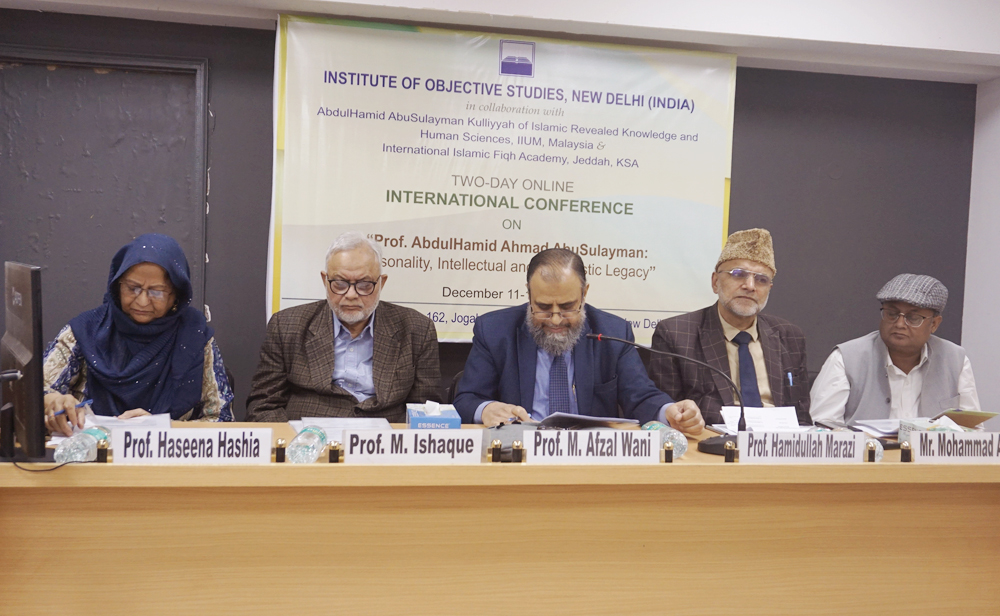
IOS two-day International Conference on “Prof. AbdulHamid Ahmad AbuSulayman: Personality, Intellectual and Scholastic Legacy”
New Delhi: A Two-Day Online International Conference on “Prof. AbdulHamid Ahmad AbuSulayman: Personality, Intellectual and Scholastic Legacy” was organised by the Institute of Objective Studies in collaboration with AbdulHamid AbuSulayman Kulliyyah of Islamic Revealed Knowledge and Human Sciences, IIUM, Malaysia and International Islamic Fiqh Academy, Jeddah, KSA on December 11 and 12, 2024.
The conference extending over two days was thematically structured to base on Six Sessions, including an Inaugural Session, Four Technical Sessions and a Valedictory Session.
Inaugural Session
The beginning was made by the recitation from the Holy Qur’an by Mr. Shahbaz Alam, a student from INCIEF University, Malaysia.
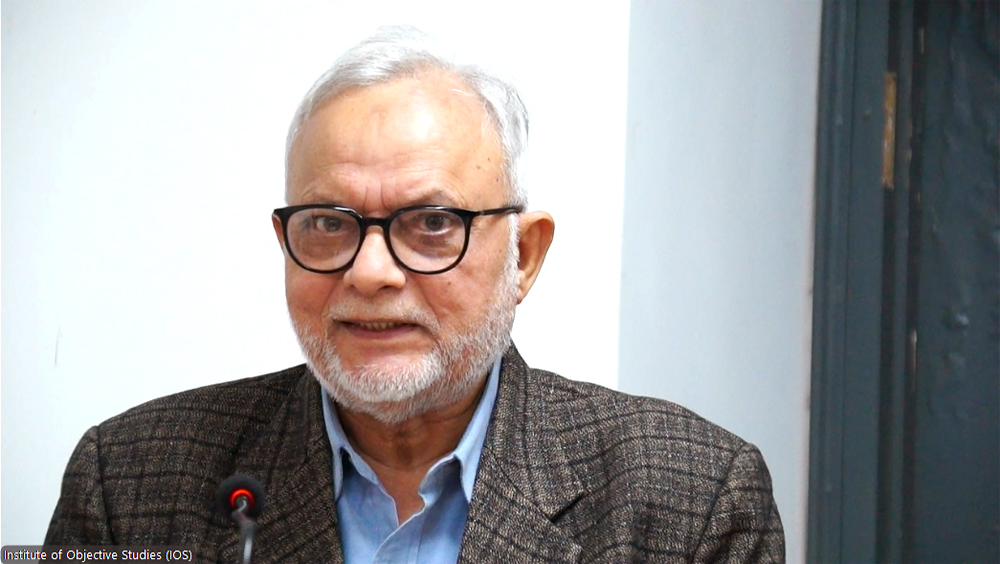
Former Dean, faculty of humanities and languages, Jamia Millia Islamia, New Delhi, Prof. Mohammad Ishaque presented the theme of the conference. . Prof. Hamidullah Marazi, visiting fellow, ISTAC, IIUM, Malaysia, presented the profile of Prof. AbuSulayman. Secretary General of the International Islamic Fiqh Academy, Jeddah, KSA, H.E. Dr. Koutoub Moustapha Sano delivered the keynote address. There was a special address from Chief patron and founding chairman of the IOS, Dr. Mohammad Manzoor Alam which was read out by the secretary general of the IOS, Mr. Mohammad Alam because of his inability to attend physically. Address as a Guest of Honour was delivered by former founding secretary general, Alwaleed Bin Talal Foundation, KSA. The family of Prof. Dr. AbdulHamid AbuSulayman was represented by his daughter, former founding secretary general, Alwaleed Bin Talal Foundation, KSA. Dr. Muna AbuSulayman who delivered a touching speech on the occasion. The Dean, AbdulHamid AbuSulayman Kulliyyah of Islamic Revealed Knowledge and Human Sciences, IIUM, Malaysia, Prof. Dr. Shukran Bin Abd. Rahman also delivered a speech as another Guest of Honour of the session. The Session was presided over by Prof. M. Afzal Wani, Chairman of the Institute of Objective Studies. Prof. Haseena Hashia extended a vote of thanks to the speakers and participants of the conference.
Former dean, faculty of humanities and languages, Jamia Millia Islamia, New Delhi, While giving an introduction of the Institute and theme of the conference, Prof. Mohammad Ishaque said, IOS is a non-political and not-for-profit organisation and an NGO in consultative status (Roster) with the Economic and Social Council (ECOSOC) of the United Nations. The Institute has been recognised nationally and internationally for promoting research, conducting surveys on relevant themes, publishing books and journals in areas of national concern and pressing challenges of civil societies, awarding scholarships to meritorious university scholars, actively participating in social welfare, educational and management fields. The focal areas may also be identified for developing models suited to the Indian masses, particularly the poor, marginalised and deprived sections. He noted that the institute organised conferences, seminars, symposia and workshops at national and international level and discussions at headquarters and various chapters on relevant themes. So far, more than 1350 such gatherings have been organised successfully.
Prof. Ishaque said that Prof. AbuSulayman made a profound contribution to the inter-faith dialogue. His works were the spring board for the young scholars to understand Islam in broader perspective. His ideas stood for charity, pride, brotherhood and solidarity. He realised that cultural crisis in Ummah was caused by absence of cultural progress. Prof. AbuSulayman was a towering personality among Islamic scholars. His ideas were grounded in Islamic knowledge, he noted.
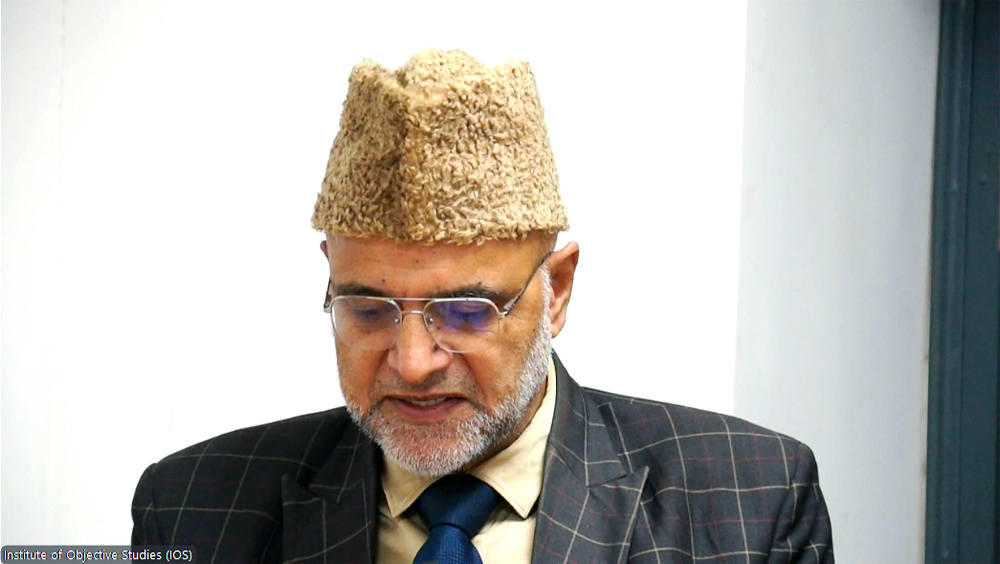
Prof. Hamidullah Marazi, while presenting the profile of Prof. AbuSulayman. He said that Prof. AbuSulayman stood as a monumental figure in contemporary Islamic thought, celebrated for his extensive contribution to the Islamisation of Knowledge and educational reforms across the Muslim world. His remarkable journey from the sacred city of Mecca to becoming a revered scholar and educator, reflected a deep and nuanced engagement with both Islamic tradition and the complexities of modernity. He observed that the vibrant intellectual milieu surrounding him, populated by scholars and practitioners of Islamic sciences, profoundly shaped his worldview and instilled a lifelong passion for the pursuit of knowledge. Prof. AbuSulayman developed an acute awareness of the interplay between faith and reason. He often expressed that “the foundation of our understanding must be rooted in both tradition and rational inquiry”, a guiding principle that would inform his scholarly endeavours throughout his life. This dual commitment to faith and reason positioned him as a bridge between the past and present and the tradition and modernity.
Prof. Marazi held that one of Prof. AbuSulayman’s most significant contributions was his tenure as a founding member and the second rector of the International Islamic University (IIUM), Malaysia from 1989 to 1999. Under his visionary leadership, IIUM evolved into a vibrant academic institution that harmonised Islamic teachings with modern knowledge fostering critical thinking and ethical education. “Prof. AbdulHamid Ahmad AbuSulayman remains a pivotal figure in the discourse surrounding the Islamisation of Knowledge and educational reforms. His efforts to integrate Islamic principles with modern educational practices have left an indelible mark on the landscape of Islamic thought. As the Muslim world navigates the complexities of the modern age, his insights serve as a guiding light, emphasising the importance of a comprehensive, ethical and integrated approach to knowledge that meets the needs of society”, he pointed out.

H.E. Dr. Koutoub Moustapha Sano, in his keynote address, observed that Prof. AbuSulayman was an intellectual giant, a critical scholar, a social critic and effective administrator. His intellectual journey of more than a half century, was innovation and cross-fertilisation of ideas and practical solutions. He was always interested in knowing the causes of the decadence and backwardness of the Muslim Ummah on the one hand and attempted at developing mechanism and methods of overcoming them on the other. He always argued vehemently that Muslims did not lack good belief system. He believed that the Muslim Ummah suffered from intellectual malaise that required profound and serious diagnosis. He said, “It is a lived experience in thought and its translation into institutions. His works demonstrate profundity and comprehensiveness comprising international relations, Islamic economics, and education in light of primary Islamic sources as part of the transformative agenda focusing on education and girls, reform, corruption. In his analysis of the global issues, he believed that the first step is to create a critical approach to the reality based on innovation and creativity”.
Dr. Sano held that Prof. AbuSulayman was certainly a visionary, an intellectual and a thinker very sincere and honest. He embodied the lofty Islamic universalistic values of truthfulness honesty, dedication, kindness, equity, non-discrimination and excellence. Above all, he was a father figure for many who passed through IIUM. He transformed the trajectory of the IIUM to become a truly international institution. He truly worked for the Ummah and humanity at large. Owing to his tireless efforts, many of his students became policy makers, politicians, scholars, judges, lawyers, businessmen and businesswomen in different parts of the world. Undeniably, he contributed hugely to the socio-economic and intellectual development of Malaysia. Prof. AbuSulayman identified several misconceptions and malformations in the thinking of the Ummah leading to an intellectual crisis. In his approach, he rejected the severing of the spiritual from the mundane. Rather, he called for the unification of the spiritual values and ethics with the mundane with regard to the technical applications. He noted that the alternative paradigm Prof. AbuSulayman discussed in his book, in particular, ‘Crisis in the Muslim Mind’ was Islamic Islah which meant the authenticity of Islam. This involved a proper methodology with regard to education and knowledge creation and development. He emphasised the need for developing new readings and interpretations to respond intelligently to new challenges with regard to social cohesion and the development of a functional and harmonious family, Dr. Sano added.
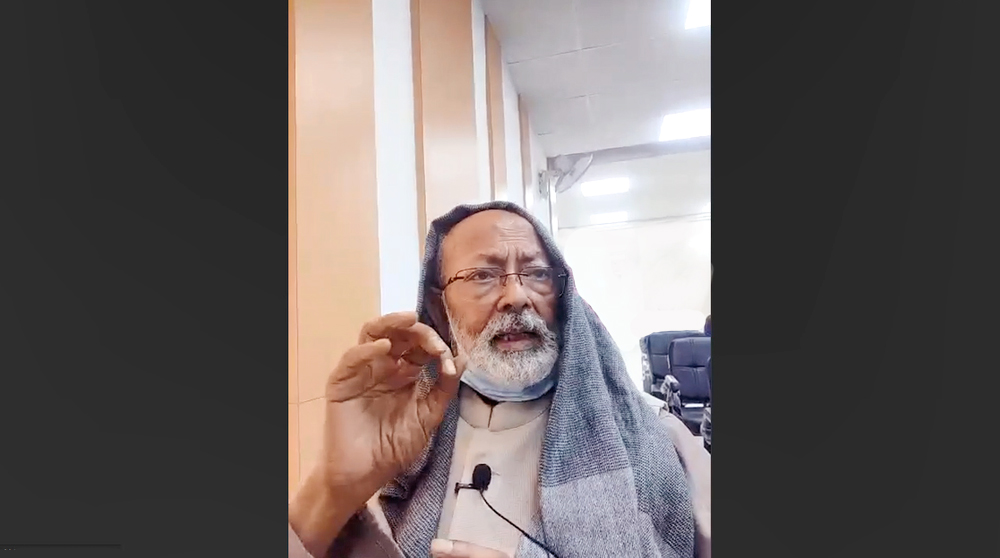
Dr. Mohammad Manzoor Alam said that Prof. AbuSulayman was a remarkable man who was a reform-minded intellectual and an exemplary Muslim. His writings demonstrated his in-depth understanding of the Quran and Sunnah. He stood apart from other Islamic academics because he did not subscribe to conventional interpretations of Islam. His writings stimulated Muslim intellectuals’ minds and exhorted them to quit blaming others for their failures and instead, look within for answers. “He exemplified the critical thinking and forward-thinking mind-set that are essential to bringing about a renaissance and resurrection in the Muslim world. With a lofty vision and mission of a comprehensive Islamic reform project with reform of thoughts and education, he dedicated his entire life to the advancement of education in the Islamic world and consistently pushed for the transformation of Muslim societies via knowledge of the Quran and Sunnah”.
Dr. Mohammad Manzoor Alam maintained that Prof. AbuSulayman made four trips to India to attend seminars and conferences hosted by the IOS. In February 2001, he received the honorary D.Litt. from Jamia Hamdard, New Delhi. He delivered two lectures at Aligarh on ‘Violence and Islam’ and ‘Child Development in Islamic Perspective’. He asked everyone who is devoted to Prof. AbuSulayman’s ideas, thoughts, information, and books – especially IIIT and IIUM, to consider how to realise his aspirations in the light of shifting global landscape, particularly in the wake of the pandemic and evolving technological development.
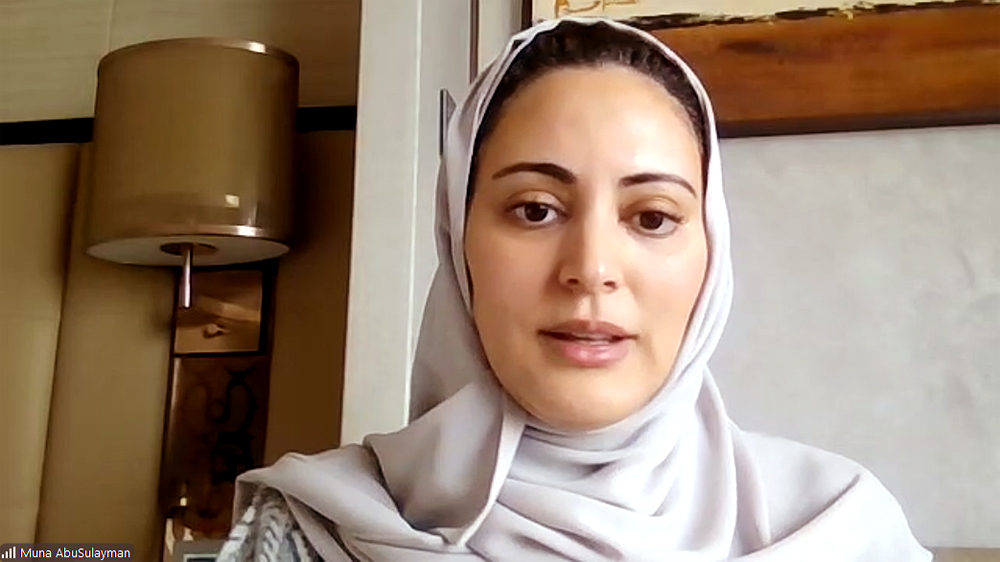
Delivering her speech, Dr. Muna AbuSulayman, said that his father, Prof. AbuSulayman, was an intellectual doyen and a visionary. He was a philosopher, and did a lot of work in the field of Islamic civilisation and philosophy for the coming generations. He made several areas accessible for researchers. He had a long list of students and left behind a rich intellectual legacy for the young generation. He was beyond narrowness and had a global reach, she pointed out.
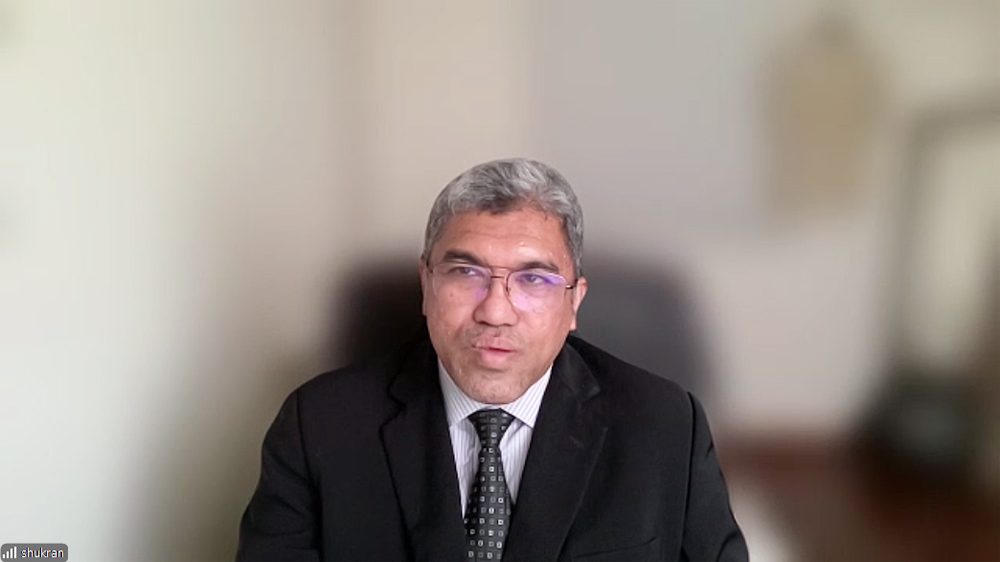
In his address Prof. Dr. Shukran Bin Abd. Rahman, said that he had the privilege of working with Prof. AbuSulayman. He did a missionary work on education which would inspire future generations. His theory of Islamisation of Knowledge was an area which was being strengthened by his students. According to him, there were three domains of knowledge – human knowledge, sound knowledge and Islamic knowledge. Prof. AbuSulayman was instrumental in conceptualising Kulliyyah knowledge of Islamic discipline. He tried to achieve the goal of holistic development of curriculum. He made an invaluable contribution to the development of a culture by using his knowledge, Dr. Rahman pointed out.
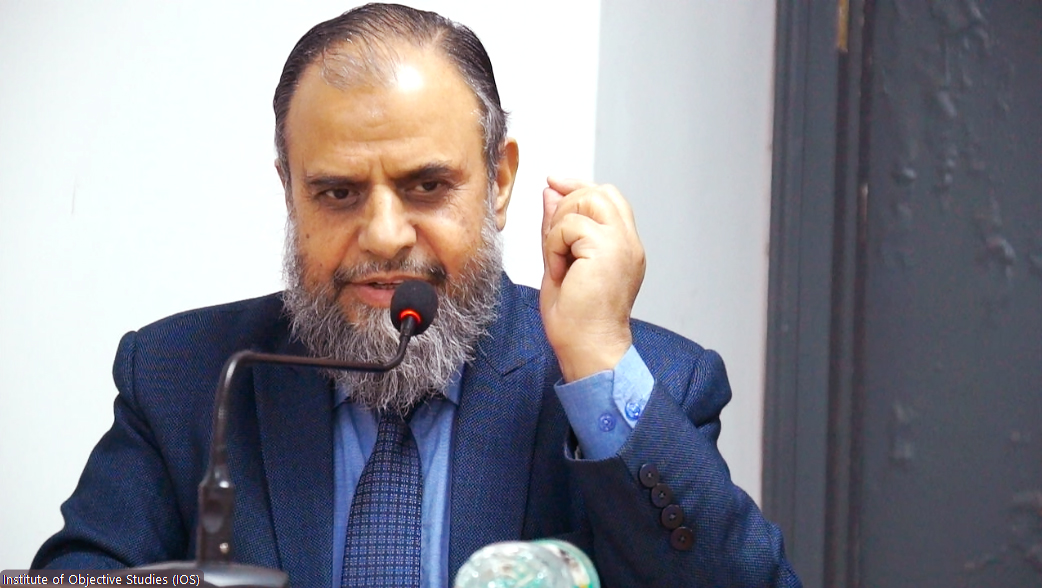
Delivering the Presidential address, Prof. M. Afzal Wani, put the conference in an objectively valuable context by referring to the Quranic Verse: “[While the wicked people] make will and effort to blow out the ‘Noor of Allah’ with their mouths (utterances): but Allah will carry ‘His Noor’ to perfection in all its fullness; painful though it may be to all those who ‘Deny the Truth’. [Al Quran, Surah Saff: 8] He explained that the people with such averse-intentions and actions are found among the human beings almost in every age, but Allah keeps on creating people with good intentions and actions to work to maintain and sustain the enlightenment created by Noor of Allah, in its promised endurance. Prof. Wani asserted that the life of Prof. AbdulHamid Ahmad AbuSulayman should be, in all its reflections, understood as one of those blessed persons who choose to work, during their lives, to expand in its perfection the enlightenment created by Noor of Allah. He devoted his life to endeavour for the establishment of institutions of international repute and train his students and friends to serve this great cause, important for all the people of the world. Prof. Wani mentioned that Prof. AbuSulayman had opined that faith should not be diluted, it should rather be strengthened with zeal for knowledge. Counting the qualities of Prof. AbuSulayman, Prof. Wani referred to his woks exploring the realities behind crisis in human mind, need for rightful parenting, access to knowledge, desiring a harmonious world and a better future of humanity. Prof. Wani also stated that Prof. AbuSulayman was a person with leadership qualities to perform well in the contemporary times, possessing compassion, reason, humility and respect for others. “Prof. AbuSulayman, besides having respect for others, talked much about Tawakkal, courage, observance of the purpose of Ibadah, to strengthen the faith and Tawakkaltu Alallah”, Prof. Wani elucidated. He remarked much emphatically, with reference to the writings of Prof. AbuSulayman and his underscoring the principle of Asalah, that the courage necessary to stand for humanity, human friendliness, protection of global environment (including plant and animal kingdom), peace and justice comes from of the real enlightenment, the Noor of Allah”. Concluding his Presidential address, Prof. Wani noted that the life of Prof. AbuSulayman, through so many destinations across the world, is full with inspiration and guidance for working for others with commitment and concern. The closeness between him and Dr. M. Manzoor Alam, Founder of IOS is a great example of intellectual togetherness for working in the arena the knowledge and enlightenment.
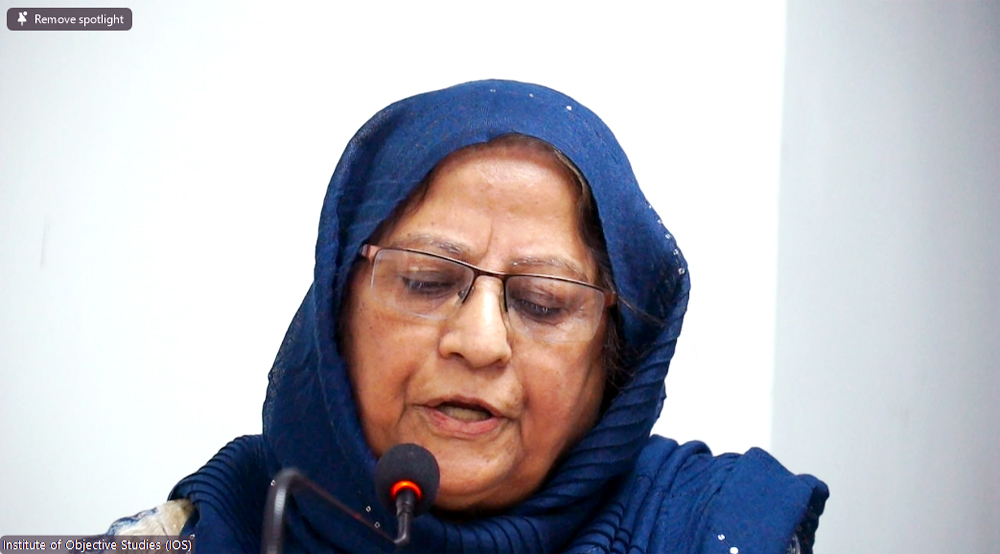
At the end of inaugural session, the vice-chairperson of the Institute, Prof. Haseena Hashia thanked all the speakers, participants, media persons and the organizing staff for their contributions.
Technical Session-I
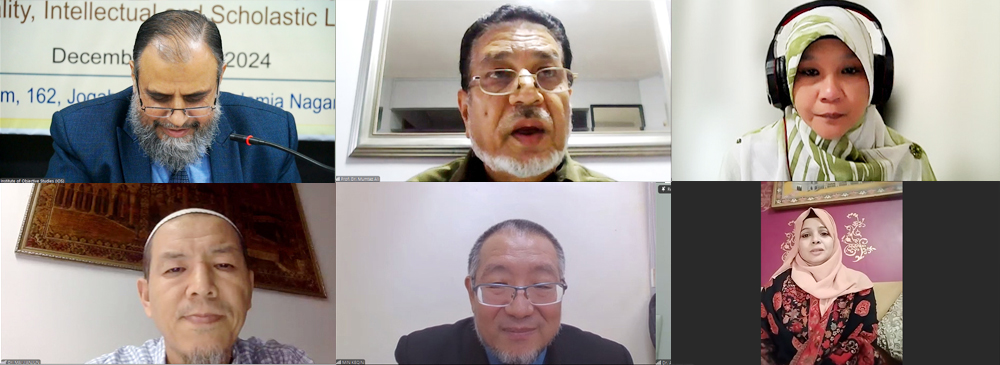
Presided over by Prof. M. Afzal Wani, the first technical session focused on ‘Personal life, orientation and emergence as an extraordinary expert of societal issues’. First speaker of the session was Prof. (Dr.) Muhammad Mumtaz Ali, professor, department of Usuluddin and Comparative Religion, AHAS Kulliyyah of Islamic Revealed Knowledge and Human Sciences, IIUM, Malaysia. He spoke on ‘Methodologic Issues: A Critical Analysis of the Contribution of Prof. AbdulHamid AbuSulayman.’ He said that he included Prof. AbuSulayman in the list of Revivalist scholars. Revival of humanity was necessary for the survival of humanity, and for this revival of Islamic intellectual framework was necessary. According to time and context, revivalists re-conceptualised the Islamisation of human knowledge. They wanted to see Ummah as a developed Ummah. He emphasised the need for reviving Islamic thought through the methodology. Intellectual reform must be rational and empirical. He was determined to achieve Islamic reform. Prof. AbuSulayman offered to give new Islamic theory of methodology – methodology of Islamic thought. He countered western view of Islam by setting forth the exclusiveness of Islamic thought, Dr. Ali said.
The second speaker was Prof. (Dr.) Rahmah Binti Ahmad H. Osman, Professor, AHAS Kulliyyah of Islamic Revealed Knowledge and Human Sciences, IIUM. She noted that Prof. AbuSulayman was a profound scholar who looked into the potential of Islamic thought. He transformed the research concept despite his fragility. He called for dignity of every individual. He was nurturing Islamic intellect. In England, he commanded respect. He was not only a scholar, but also a servant of humanity. He wanted that Arabic should be learnt by every Muslim, she held.
Dr. Mahmud Mai Jianjun, assistant professor, AHAS Kulliyyah of Islamic Revealed Knowledge and Human Sciences, IIUM, focused on ‘Cultivating a Tawhidic Mentality for Muslim Ummah’s Renewal.’ He said that there was crisis in Muslim societies. There was much concern among Muslims over the sufferings of Palestinians. He called for addressing issues of Islamic thought. There was also the need for actualisation of Islamic worldview and the change in the mindset of Muslim Ummah. Muslims should gain knowledge because science and technology have limitations. He said there is no power except and Taqwa and Sunnah are essential parts of Islam. In Qur’an, Allah promises to held believers. “If you support Allah, He will support you. Tawheed is key and the solution to the problem originates in religion”.
The fourth speaker was Dr. Min Ke Qin, assistant professor in AHAS, Kulliyyah of Islamic Revealed Knowledge, IIUM, who spoke on ‘Prof. AbdulHamid A. AbuSulayman’s era and atmosphere.’ He said that Prof. AbuSulayman was ahead of his age. He emphasised the need for revitalisation of higher education among Muslims. Muslim countries were facing poverty and Ummah was facing a phase of poverty. There was a problem of the state of Israel and the countries around it were facing humiliation. Ummah was growing weak and weak. “Israel is a permanent hurdle to the peace in the region. This is the crisis which the Muslim countries should seek solution.”
The last speaker of the session was Dr. Lubna Naaz, guest faculty, department of Islamic Studies, Women’s College, Aligarh Muslim University, Aligarh, who centered on ‘Societal issues facing the Muslim world: A Study of Prof. AbdulHamid A. AbuSulayman.’ She said that Prof. AbuSulayman laid emphasis on Islamisation of education in society. He pleaded for universal principles of justice. He also called for incorporation of Islamic values in education. He laid emphasis on the revival of Islamic civilisation, she added.
Technical Session-II
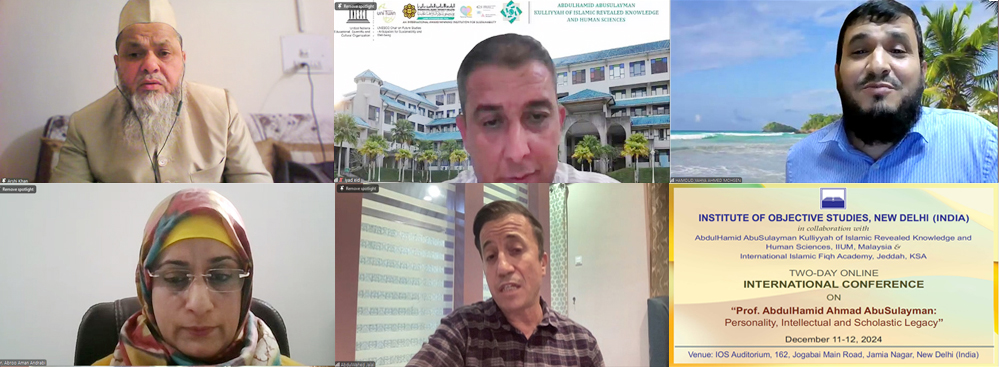
The second technical session was chaired by Prof. Arshi Khan, professor, department of Political Science, Aligarh Muslim University, Aligarh. The theme of the session was ‘Prof. AbdulHamid Ahmad AbuSulayman’s educational and academic pursuit at International Islamic University Malaysia.’
Prof. Iyad M.Y. Eid, assistant professor, AHAS Kulliyyah of Islamic Revealed Knowledge and Human Sciences, IIUM, was the first speaker of the session, who focused on enhancing student’s academic research skills through IIUM vision to restore the revival of the Ummah. He described Prof. AbuSulayman as a great thinker and a receiver of knowledge. He contributed to society, Dr. Eid said. He was followed by Dr. Hamoud Yahya Ahmed Mohsen, assistant professor, AHAS Kulliyyah of Islamic Revealed Knowledge and Human Sciences, IIUM. He spoke on ‘Three years on: Reflecting on Prof. AbdulHamid A. AbuSulayman’s transformational leadership and its lasting impact at IIUM.’ He held that Prof. AbuSulayman was regarded as a unique gem in the Muslim world. He propounded the theory of Integration of Islamic Knowledge with modern disciplines. He was a global leader of Islamic education. He had a lasting imprint on education. Prof. AbuSulayman generated a new life in academics, Dr. Mohsen pointed out.
Dr. Abroo Aman Andrabi, assistant professor, department of Islamic studies, Jamia Hamdard, New Delhi was the third speaker who touched upon ‘Prof. AbdulHamid A. AbuSulayman: A visionary legacy in Islamic thought and scholarly reform.’ She said that Prof. AbuSulayman reflected compassion, humility and human dignity. His ideas were responsive to modern challenges. He called for methodological and scientific development without compromising Islamic thought. He also said that there should be global discourse of human rights in the Muslim framework. He wanted the integration of Islamic knowledge with global knowledge, she noted. The fourth speaker was Dr. Abdul Wahed Jalal Nori, assistant professor, AHAS Kulliyyah of Islamic Revealed Knowledge and Human Sciences, IIUM. He referred to Prof. AbuSulayman’s idea of the distribution of resources and the quantification of justice. They touched upon several issues, like economic priorities according to Islam, ethical leadership of Muslims and addressing contemporary global economic crisis raised by Prof. AbuSulayman.
The last speaker of the session was Mr. Muhammad Mahmood Shihab Al-Naimi, researcher in the field of Islamic thought, Malaysia. He spoke on the repercussions of distorting the Islamic world vision from Prof. AbdulHamid A. AbuSulayman’s perspective. He discussed quantification of scientific paradigm and programmes. He also shed light on the science of Shariah and engineering.
Day-2, December 12, 2024
Technical Session-III
.jpg)
The third technical session was chaired by Prof. Hamidullah Marazi. The session focused on works of Prof. AbdulHamid Ahmad AbuSulayman.
The first speaker of the session was Dr. Mohamed Sheikh Alio, assistant professor, AHAS Kulliyyah of Islamic Revealed Knowledge and Human Sciences, IIUM. He spoke on the Arabic works of Prof. AbdulHamid A. AbuSulayman. He said that Prof. AbuSulayman was a great Muslim scholar, leader, thinker, educationist, author and capacity builder. He introduced innovative ideas to the contemporary traditional discourse regarding Islamisation of Knowledge. He contributed to 23 major Arabic works, either as a sole author, co-author or editor in a time span of 59 years. He published 39 articles between 1965 and 2015 through 12 journals in nine countries, including India, Malaysia, Morocco, Qatar and Saudi Arabia. His works had theoretical and institutional impact on Muslim Ummah, Sheikh Alio noted.
The second speaker was Dr. Mohammad Muslim, assistant professor, department of Islamic Studies, AMU, Aligarh. He dwelt on ‘Islamic parenting: A study of Prof. AbdulHamid A. AbuSulayman.’ He said nowadays parenting is a big challenge. Children need attention of their parents because they are careless. They should get Islamic parenting. Parenting is not an easy thing. Parents should first learn Islamic values. There should be parent-child relationship as suggested by Prof. AbuSulayman. Environment in which they are living should be favourable to Islamic values. Surah Luqman of the Qur’an has laid down guidance for parenting, he observed.
The third speaker was Dr. Mohammad Ajmal, assistant professor, Centre for Arabic and African Studies, School of Language, Literature and Culture Studies, Jawaharlal Nehru University, New Delhi. He spoke on “The genius of Prof. AbdulHamid A. AbuSulayman in the light of his book ‘The problem of tyranny and corruption in Islamic thought and political history: A critical and analytical assessment.” He said that the Ummah imbibed Islamic values and Islamic teachings since the beginning to lead the life in a good way. Prof. AbuSulayman stressed the need for building the concept of society as per Islam. He also insisted on preventing the prevailing corruption and tyranny in Muslim countries.
The fourth speaker was Dr. Fauzia Maraam, former Ph.D. fellow, department of Islamic Studies, AMU, Aligarh. She spoke on Prof. AbdulHamid A. AbuSulayman’s book ‘Parenting: An exploration in Parent-Child Relations: A guide to raising children.’ She referred to the rights and duties of parents and children. She also discussed the role of the family and a healthy environment to raise children. Parents must produce children who love Allah. Prof. AbuSulayman used to emphasise the need for building a good and strong nation, she said. The fifth speaker was Dr. Rukhshanda Shaheen from the department of Islamic Studies, AMU, Aligarh. She dwelt on ‘Crisis in Muslim thought: A critique of Prof. AbdulHamid A. AbuSulayman.’ She observed that according to Prof. AbuSulayman, Ummah is a prisoner to the old ideas. He discussed the methodological ideologies. He wanted that the Islamic knowledge be integrated with modern knowledge, she held. Dr. Mohammad Azam Qasmi from the department of Sunni theology, AMU was the sixth speaker who focused on the ‘Character and Personality Development: The perspective of Prof. AbdulHamid A. AbuSulayman.’ He said that Prof. AbuSulayman laid emphasis on the role of parents in the character building of a child. This was very important for friendship and shared values. This was also essential for moral, ethical, intellectual and social development, he noted. Dr. Mohammad Shekaib Alam of the IIUM was the last speaker of the session who spoke on ‘Islamic principles in International Relations: A value-driven approach to Conflict Resolution and Peace Building.’ He said that the world was consistently in conflict. Islamic theory of international relations was the answer to the contemporary global problems. He held that the involvement of the US and Russia was responsible for ignoring human rights. There was a need for consultation and consensus building in the world, he added.
Technical Session-IV
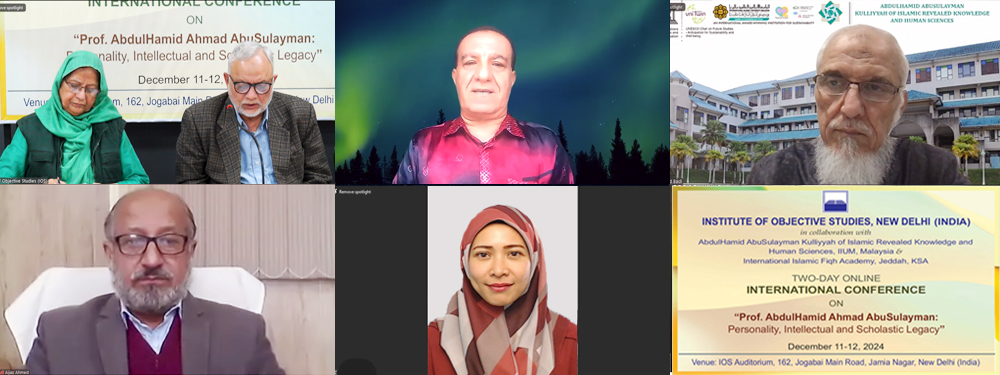
Chaired by Prof. Mohammad Ishaque, the fourth technical session was focused on Islamiyat Al-Ma’arifah and Prof. AbdulHamid Ahmad AbuSulayman’s thoughts. Prof. (Dr.) Asem Shehadeh Saleh Ali, head, AHAS Kulliyyah of Islamic Revealed Knowledge and Human Sciences, IIUM was the first speaker who spoke on ‘The collective mind in the Islamisation of Knowledge according to Prof. AbdulHamid A. AbuSulayman in the light of epistemology.’ He said that Prof. AbuSulayman called for application of Islamisation of Knowledge and incorporation of collective minds. His approach was analytical. He stressed the need for identifying areas of agreement and disagreement. He said analysis is dynamic. Prof. AbuSulayman left an intellectual legacy of Islam, he observed. Prof. (Dr.) Jamal Ahmed Bashier Badi, professor, AHAS Kulliyyah of Islamic Revealed Knowledge and Human Sciences, IIUM who touched upon the topic ‘Prof. AbdulHamid A. AbuSulayman’s project on creative thinking from an idea to reality.’ He said that in 1995, Prof. AbuSulayman formed a committee consisting of 10 academicians from different departments of IIUM, Malaysia to design a syllabus. In December 1996, he established the general studies department under Kulliyyah of Islamic Revealed Knowledge and Human Sciences, IIUM. He had a visionary intellect. He suggested that his creative thinking should be included in universities in the Muslim world as a subject. But the creative thinking course has since been abolished in the IIUM, he said.
The third speaker was Dr. Aijaz Ahmed, associate professor, department of Islamic Studies, AMU, who spoke on ‘Prof. AbdulHamid A. AbuSulayman’s way of thinking: A study with special reference to his integrated approach to education and intellectual reform.’ He called Prof. AbuSulayman a great scholar and a visionary. He occupied a distinctive place among Islamic scholars. He was very practical. Many internal and external challenges were imposed by western scholars on Islamic knowledge. He was for the revitalisation of Muslim education for the benefit of Ummah. He also stressed the need for generating and sharing Islamic knowledge and values, Dr. Ahmed stated.
The last speaker of the session was Dr. Siti Hadija Mohd, assistant professor, department of History and civilisation, AHAS Kulliyyah of Islamic Revealed Knowledge and Human Sciences, IIUM. The theme of her discussion was ‘Historiographical documentation and impact assessment of Prof. AbdulHamid A. AbuSulayman’s selected public addresses. She said that Prof. AbuSulayman’s public addresses presented a significant, yet under-appreciated part of his intellectual legacy. His personal addresses were filled with personal anecdotes. His speeches were delivered during critical times when Muslims faced internal and external challenges. Calling for engaging with the Qur’an, he laid emphasis on the education that fostered independent thing which was creative and problem solving, she held.
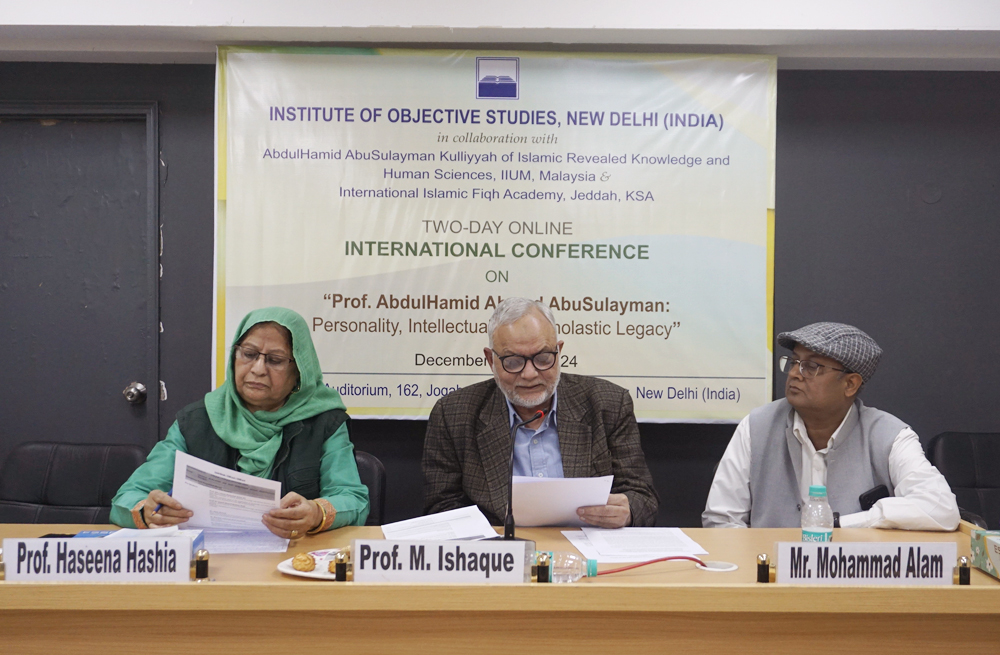
Valedictory Session
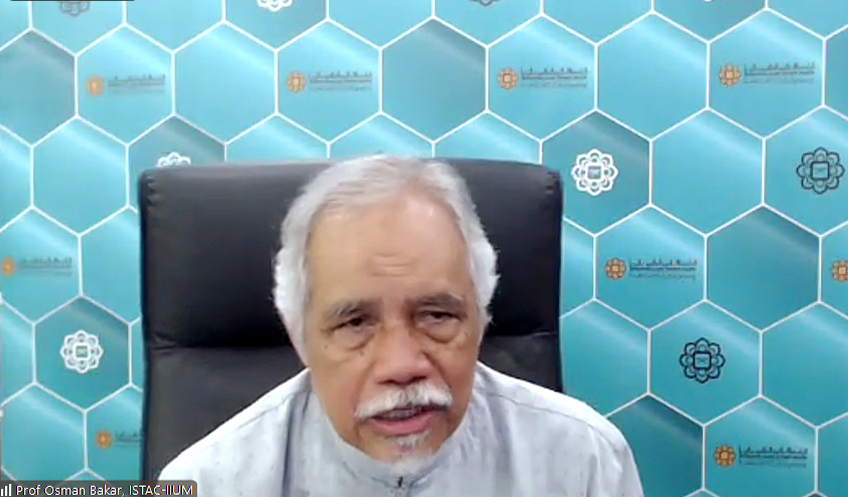
As a guest of honour at the valedictory session, Prof. Emiratus Datuk Dr. Osman Bakar, rector, IIUM, Malaysia said that IIUM humbly remembered the legacy of Prof. AbdulHamid Ahmad AbuSulayman. He was a visionary man for integrating Islamic knowledge with modern education. He addressed ethical and moral challenges. He promoted cultural dialogue. Owing to his endeavours, IIUM is the world’s leading Islamic University. He also promoted contemporary thinking among Muslim intellectuals. He had a holistic approach to epistemology and world view. He asked for drawing inspiration from Prof. AbuSulayman’s legacy.
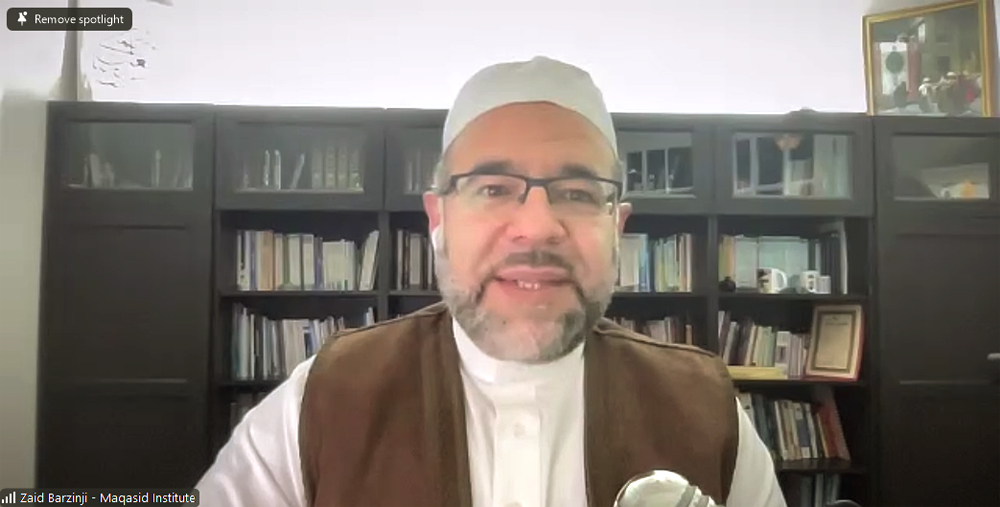
Dr. Zaid Barzinji, president, Maqasid Institute, USA, in his speech as another guests of honour, observed that Prof. AbuSulayman excelled in economics too. He said that his thoughts were driven by Allah and what Allah expected of him. He knew that his vision required several generations to realise. He said “The Qur’an has reflection of cycles. There is need for discovering and committing to the Qur’an. World view is the starting point of reflection cycles. The challenge is to trust ourselves to approach the Qur’an. Reform cycles also apply in education and life.” While Prof. AbuSulayman was involved in reforming higher education, he also cared about early learning as a critical point, Dr. Barzinji said.
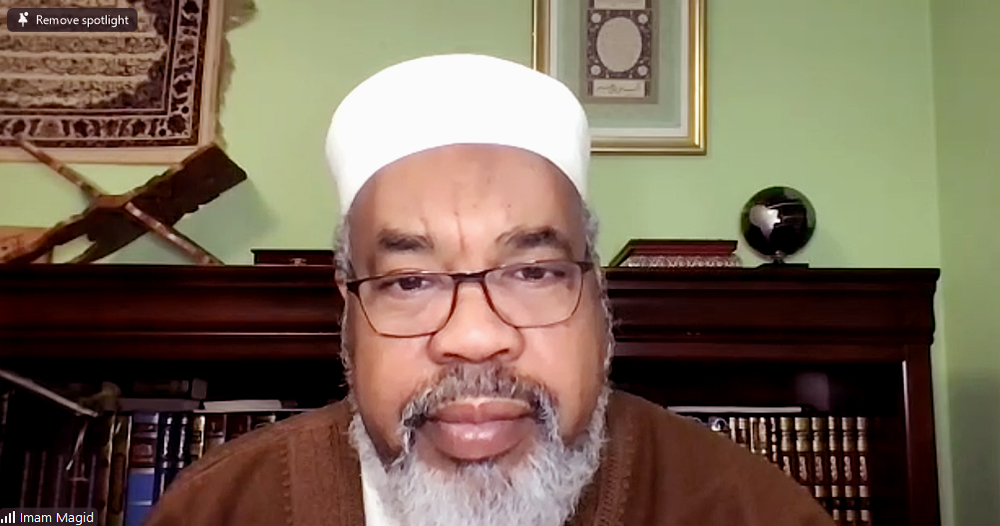
Imam Mohamed Magid, former president, Islamic Society of North America, USA, as another guest of honour, observed that Prof. AbuSulayman was a great contributor. He believed that there was gap between text and context, and tried to address the complications of context. His contributions were very amazing. His approaches included the holistic approach to the Qur’an, the life-style of the Prophet (PBUH) and the encouragement to the people to understand the context. He allowed one to engage with him, Imam Magid maintained.
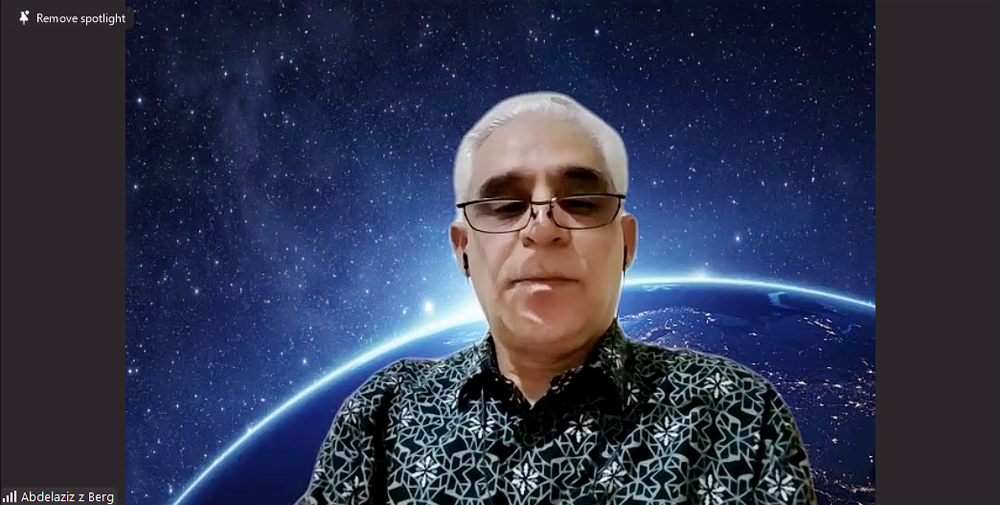
Datuk Prof. (Dr.) Abdelaziz Berghout, Dean, International Institute of Islamic Thought and Civilisation, AHAS Kulliyyah of Islamic Revealed Knowledge and Human Sciences, IIUM, held that Prof. AbuSulayman’s multi-disciplinary background like, economics, Islamic Studies, led him to identify Islamic perspective. He developed the idea of Islamisation of Knowledge. In him, Muslim mind was more inclusive. “Islamisation of knowledge means dealing with our legacy. His dynamism of Islamic knowledge has four points – Importance of Maqasid of the Qur’an and importance of reform of the Muslim mind; Muslim mind to deal with law; Importance of Ikhlaq or ethics and importance of Ijtihad of Muslim mind or Muslim world”, Dr. Berghout added.
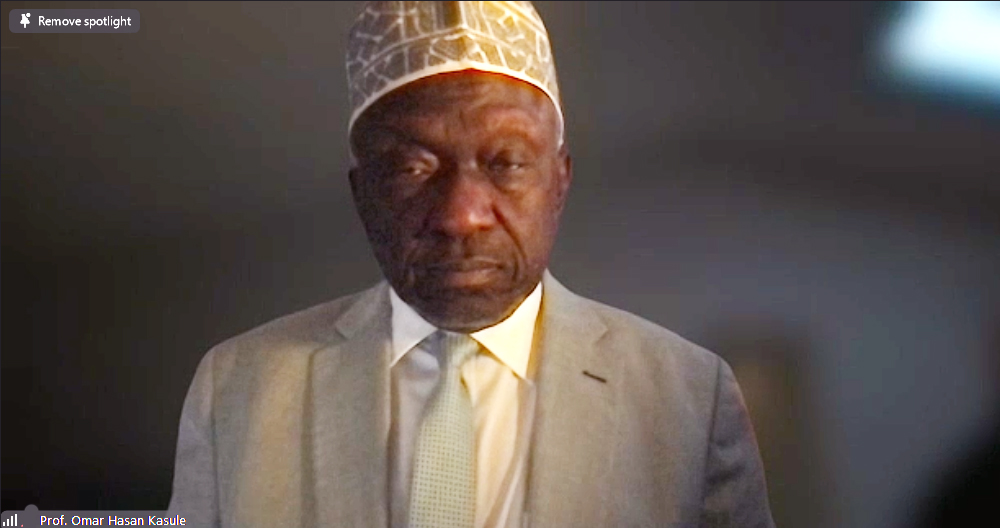
In his valedictory address, Prof. Omar Hasan Kasule, secretary general, IIIT, USA, held that Prof. AbuSulayman left a rich legacy which reflected his character and personality. His social service involved helping pilgrims in Makkah during the Hajj. He was also an investor who invested in the real estate in Makkah. He had forays into public administration and academic administration. He was a thinker, author and a good husband. He was a dedicated family man and considerate to the weak. He spared time for small problems and respect for others. Though he had strong opinions, yet he was not against others. He had strong arguments for what he believed and not strong in attacking others. Several things made him somebody. These were: character-intellectual; Think by looking around you and actual problem of the Ummah. He was a global thinker, original thinker, brave thinker and had unique packaging of thoughts. He used long sentences with some repeats because he wanted related facts together. He focused on small problems. He said that Prof. AbuSulayman did not give references because he was an original thinker. He had long sentences, some of which were of half a page or one full page, Prof. Kasule concluded.
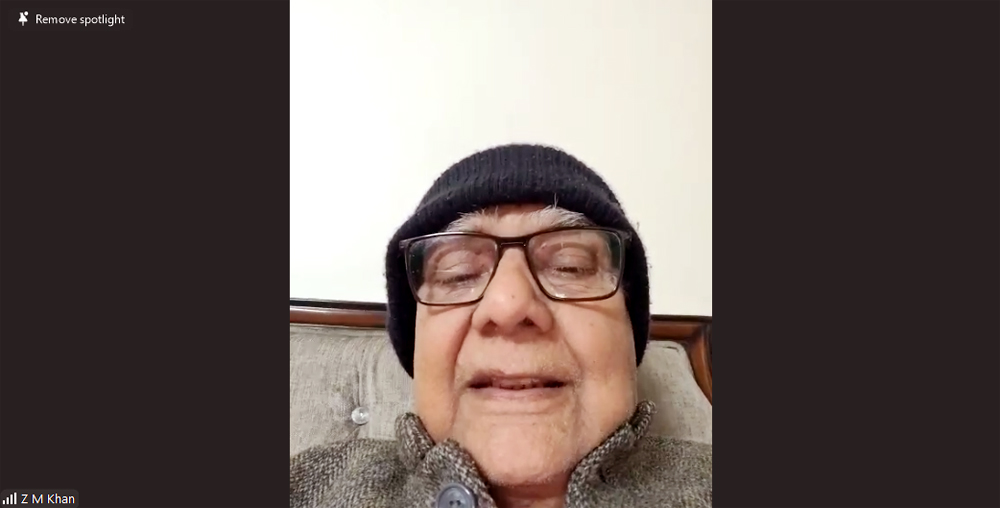
In his presidential address, patron of the IOS, Prof. Z.M. Khan, said that he had a chance to play host to Prof. AbuSulayman in Delhi because of Dr. Mohammad Manzoor Alam. He also had an opportunity to visit he office in the United States. His views on women under Islam were very well explained. He proved how the interpretation of the Qur’an was wrongly used. He said all the generations are not the same in the eye of the Almighty. New generations revolutionise things.
At the end, a 7-point resolutions was unanimously adopted on the occasion. The resolution was read out by Prof. Mohammad Ishaque. Following is the text of resolutions:
It is a matter of immense satisfaction that the Institute of Objective Studies, New Delhi, India, in collaboration with AbdulHamid AbuSulayman Kulliyyah of Islamic Revealed Knowledge and Human Sciences, International Islamic University Malaysia and International Islamic Fiqh Academy, Jeddah, KSA successfully organised a two-day online international conference on “Prof. AbdulHamid Ahmad AbuSulayman: Personality, Intellectual and Scholastic Legacy” at New Delhi on December 11-12, 2024 via ZOOM in which academicians and scholars, at a good scale from many nations, like India, USA, Malaysia, Saudi Arabia, etc., participated and presented their research papers.
The delegates to the conference, while appreciating the organisation of this conference by the Institute of Objective Studies, adopted the following resolutions:
- While literature encompassing most of the aspects of civilisational changes had been developed in the world, especially in Europe, Prof. AbdulHamid Ahmad AbuSulayman developed thought for progress of Muslims and their march ahead, based on the Qur’an, the life of the Prophet (PBUH) and the Muslim literature with due reason and rationality.
- While facing challenges from theorists living in the scientific and technologically rich environment, Prof. AbdulHamid Ahmad AbuSulayman successfully made a way for thinking with educational missions as ingrained in the revealed knowledge, mainly the Qur’an and the Sunnah.
- While the philosophical contribution of Prof. AbdulHamid Ahmad AbuSulayman has been studied by scholars with concern in various institutions and universities, identifying reasons for crisis in Muslim mind, oppression and inequality, the scholars are urged upon to pay more attention on his writings to identify the thought for a balanced approach in present globalising world for more equity, equality and justice for all human beings living in various jurisdictions.
- That the existing institutions and universities should have specific research programmes for exploring the socio-economic and political environment, with responses of Prof. AbdulHamid Ahmad AbuSulayman.
- That proper methodologies should be developed for inter-religious understanding as has been adopted by Prof. AbdulHamid Ahmad AbuSulayman to deliver the facts with original flavors and natural essence.
- The creative thinking paper which was included in the curriculum of IIUM by AHAS Kulliyyah of Islamic Revealed Knowledge and Human Sciences has unfortunately abolished in 2023. This conference strongly proposes and recommends to the authorities concerned at IIUM to include it again, and urges upon other universities of the Muslim world to include it in their curriculum as a tribute to Prof. AbuSulayman.
- That a chair in the name of Prof. AbdulHamid Ahmad AbuSulayman in Islamic thought and International Relations may be created at the Institute of Objective Studies.
At the end of the conference, Prof. Dr. Haseena Hashia, vice-chairperson, IOS proposed a vote of thanks to the participants.
Go Back